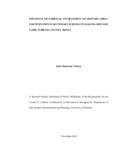| dc.description.abstract | The study aimed at investigating parental influence on refugee girls’ participation in secondary schools in Kakuma refugee camp, Turkana County. The objectives of the study were to determine the parents’ involvement in school meetings, the influence of domestic chores, their involvement in homework and parents’ levels of education (literacy) and their bearing on participation in schools. Research and fieldwork have shown that parent-school-partnerships improve schools, strengthen families, build community support, and increase student participation, retention, achievement and success. The study adopted descriptive survey design and participants were selected using purposive and simple random sampling. The study sampled 260 secondary school girls, 5 head teachers; 2 teachers and 2 Focus Group Discussion, FGD for boys. Data was collected from Form 3 and 4 girls’ from the 5 secondary schools using questionnaires for girls, key informant interviews for the head teachers and teachers, interview schedules for the two focus group discussions, FGDs for boys. The study administered the questionnaires during the pilot and repeated after two weeks. Descriptive statistics has been used for data analysis and results presented using tables and frequencies. The study adopted Bronfenbrenner, Ecological Theory which postulates that a child typically finds himself simultaneously enmeshed in different ecosystems, from the most intimate home ecological system moving outward to the larger school system and the most expansive system which is society and culture. Each of these systems inevitably interacts with and influences each other in every aspect of the child’s life. The findings show that when parents attend school meetings and discuss matters related to school with their daughters frequently (42.4%), their participation in school is enhanced. The higher the parents’ representation in school the more effective is their involvement and commitment to supporting the participation of the refugee girls in education (72.5%). The study further notes that refugee girls are engaged in household activities (81.2%) mostly at the expense of their education while the boys are spared of such responsibilities through cultural obligations. Most parents lack interest in supporting their girls to perform their homework which is likely affected due to low academic levels of the majority of the parents (4.7%). The study recommends that schools must create meaningful activities that engage parents in educational decision-making, in leadership roles, and in school governance. Efficient NGOs and humanitarian relief agencies should be encouraged and supported to promote strategies to effect the progression of girls along the education continuum including secondary schools. It is important for the stakeholders to consider an extensive study in finding out ways in which all key stakeholders can contribute to curbing early and forced marriages in the refugee camps which accounts for high dropout in this study. | en_US |



